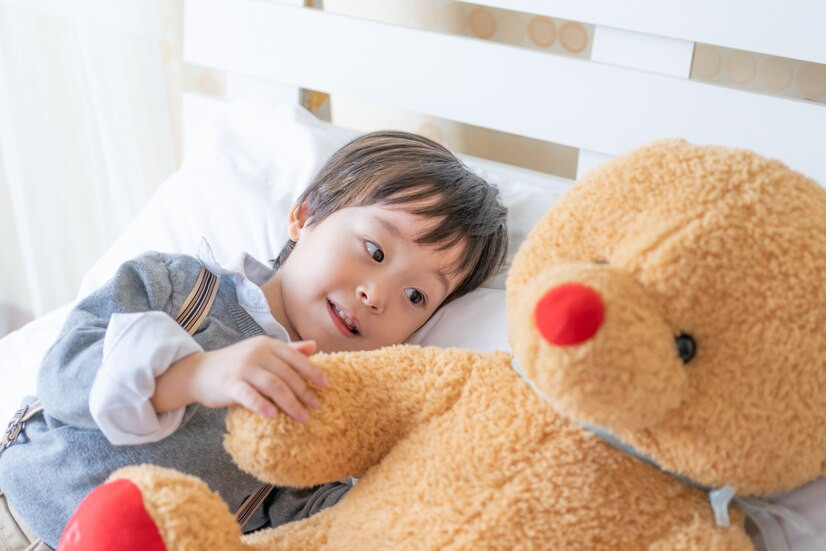Insomnia adalah gangguan tidur yang bisa dialami oleh orang dewasa maupun anak-anak. Insomnia pada anak-anak ditandai dengan kesulitan untuk tidur di malam hari, dan menyebabkan anak-anak terjaga.
Ada beberapa cara untuk membantu mengatasi insomnia pada anak. Ketahui apa saja cara tersebut.
Penyebab dan Tanda-Tanda Insomnia pada Anak
Insomnia pada anak dapat dipengaruhi oleh berbagai faktor, seperti stres yang dialami anak, masalah emosional, stimulasi yang berlebihan, rutinitas tidur yang tidak teratur, penyakit fisik, konsumsi obat-obatan, lingkungan tidur yang tidak nyaman serta kebiasaan tidur yang buruk.
Orang tua bisa mengenali tanda-tanda insomnia pada anak,sebagai berikut:
- Selalu memiliki alasan untuk menghindari tidur
- Membutuhkan waktu yang sangat lama untuk bisa tidur
- Berulang kali beranjak dari tempat tidur untuk meminta suatu hal, seperti susu, minum air putih, dibacakan cerita, dan lain sebagainya
- Terlihat sangat kelelahan namun tidak bisa tidur
- Berulang kali terbangun di malam hari dan tidak bisa kembali tidur
- Sulit dibangunkan di pagi hari
- Tidur siang terlalu lama
- Tidak memiliki jam tidur yang rutin
- Terlihat kelelahan dan tidak berenergi sepanjang hari
- Kesulitan berkonsentrasi atau mengingat banyak hal
Baca Juga: Insomnia Bukan Hanya Susah Tidur, Kenali Tanda-Tandanya
Cara Membantu Anak Mengatasi Insomnia
Pertama-tama sebelum membantu anak mengatasi insomnia, Anda perlu tahu berapa lama waktu yang dibutuhkan anak untuk tidur dalam sehari. Seperti dilansir KidsHealth, berikut adalah kebutuhan tidur anak-anak:
- Bayi usia 0-3 bulan, membutuhkan 14-17 jam tidur termasuk tidur siang
- Bayi usia 4-12 bulan, membutuhkan 12-16 jam tidur termasuk tidur siang
- Balita usia 1-2 tahun, membutuhkan 11-14 jam tidur termasuk tidur siang
- Balita usia 3-5 tahun, membutuhkan 10-13 jam tidur termasuk tidur siang
- Anak-anak usia sekolah 6-13 tahun, membutuhkan 9-12 jam tidur
- Remaja usia 14-17 tahun, membutuhkan 8-10 jam tidur
Berikut adalah beberapa cara yang bisa dilakukan untuk membantu anak-anak mengatasi insomnia:
- Memastikan bahwa ranjang hanya digunakan untuk tidur dan beristirahat. Anak-anak tidak disarankan bermain di atas ranjang
- Pastikan lingkungan tidur cukup nyaman, baik pencahayaan maupun suhu ruangan yang pas
- Atur jam tidur anak secara rutin baik di hari sekolah maupun di akhir minggu
- Pastikan anak sudah cukup kenyang sebelum tidur, misalnya minum susu atau makan camilan 1-2 jam sebelum tidur
- Ajak anak beraktivitas di siang hari agar energinya digunakan dengan benar, misalnya berolahraga, atau melakukan permainan fisik
- Ajak anak beraktivitas di bawah sinar matahari dan tidak hanya bermain di dalam kamar saja
- Batasi jam tidur siang anak dan pastikan tidur siang dimulai tidak terlalu sore
- Batasi penggunaan alat elektronik seperti televisi, ponsel, tablet, video games, dan gawai menjelang tidur
Baca Juga: Berapa Kalori yang Dibutuhkan Anak Usia 6-12 Tahun?
Habiskan lebih banyak waktu bersama, misalnya membaca buku sebelum tidur, bernyanyi bersama, menceritakan keseharian dan bercengkrama sebelum tidur. Kegiatan yang meningkatkan bonding ini membuat anak merasa rileks dan nyaman sehingga siap untuk segera tidur
Anak-anak mungkin mengalami insomnia karena trauma atau kecemasan yang dialaminya. Dalam hal ini Anda membutuhkan bantuan profesional untuk membantu mengatasi trauma dan kecemasan yang menyebabkan insomnia. Bawa anak mengunjungi ahli profesional agar mendapatkan pengobatan dan perawatan yang tepat.
Anda juga dapat memanfaatkan fitur konsultasi pada aplikasi Ai Care yang bisa diunduh di Play Store atau App Store.
Mau tahu informasi seputar kehamilan, menyusui, kesehatan wanita dan anak-anak? Cek di sini, ya!
- dr Nadia Opmalina
RaisingChildren.net.au. Insomnia. Available from: https://raisingchildren.net.au/guides/a-z-health-reference/insomnia
RaisingChildren.net.au. School-age and pre-teen sleep: what to expect. Available from: https://raisingchildren.net.au/pre-teens/healthy-lifestyle/sleep/school-age-sleep
Anne Artley, Melinda Smith, M.A., and Lawrence Robinson (2022). Childhood Insomnia and Sleep Problems. Available from: https://www.helpguide.org/articles/sleep/childhood-insomnia-and-sleep-problems.html
Kidshealth (2021). Kids and Sleep. Available from: https://kidshealth.org/en/parents/sleep.html












